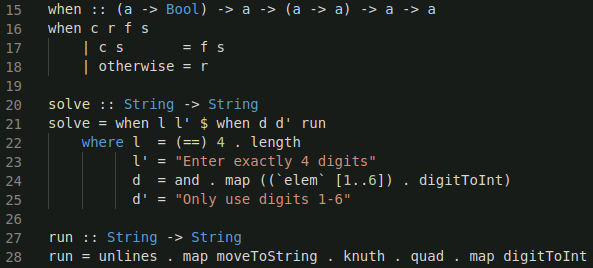
Seriously, Haskell can be annoying. It makes you think in twists and turns. What I wanted was a control flow around some input, but Haskell does not do loops, and call depth might be an issue when asking for input recursively. So what we need is an elegant way to fail when the input is incorrect.
We're working with a command-line application, so we just need to input and output string values. Our core execution type is naively (in lambda calculus, not strict Haskell):
solve : String -> String
So what we can do is on bad input also return a string, but then one with the explanation in it.
To write the checks in an elegant way, we need to think about the types more deeply. A check usually results in a Bool. We do not know what we are checking so we might need a generic function to Bool. Let's take:
when : (a -> Bool)
We will also need a message to display when the check fails, we need to input that as well.
when : (a -> Bool) -> String
The function I called when, because when everything checks out, it should run a function. Which function that is? The actual run function:
run : String -> String
But we can keep it generic because what we check is the input. So if we use a again, we can use the input that we checked. So our when execution function is:
when : (a -> Bool) -> String -> (a -> a)
We will also need to denote the input that we are checking and passing through. That is of course also of type a. And for convenience our output will also be of type a.
when : (a -> Bool) -> String -> (a -> a) -> a -> a
Notice in the screenshot I changed the String to an a. Technically that is correct, since whatever output our function to run (a -> a) has (which is a), should also be the alternative output in error.
Using this when function we can get an idea of how Haskell (or rather, Lambda calculus) can use function reduction as a strength
Given
d : String -> Bool
d' : String
run : String -> String
when : (a -> Bool) -> a -> (a -> a) -> a -> a
when d : String -> (String -> String) -> String -> String
when d d' : (String -> String) -> String -> String
when d d' run : String -> String
Note that as soon as we provide a reduction that makes supertype a explicit, the remainder of the function has a realized as type String. Also notice that our final reduction does not yield an answer of type String, but a function of type (String -> String)
And so we come to our wonderful reduction:
l : String -> Bool
l' : String
when : (a -> Bool) -> a -> (a -> a) -> a -> a
when l : String -> (String -> String) -> String -> String
when l l' : (String -> String) -> String -> String
when l l' (when d d' run) : String -> String
which is equivalent to:
when l l' $ when d d' run : String -> String
The $ simply enforces right-hand first execution without using parenthesis.
This chain can be built as long as you want, you can even construct a massive check chain from a list of type [((String -> Bool), String)]. Not that it is needed, but Haskell makes me feel like I want to show off :P
Note also the function composition going on to create l and d.
(==) : a -> a -> Bool
4 : Int
(==) 4 : Int -> Bool
length : Foldable t => t a -> Int
(==) 4 . length : Foldable t => t a -> Bool
The difference with $ being that $ enforces righthand execution, while . composes two functions without needing the execution to take place at that moment.
Note that String is the same as [Char] and that any [a] is foldable. That is why that function is allowed in context.
For d there is a similar reduction but I am getting tired typing it out. As you can see I also have not mastered a very consistent code style, some things look slightly different than others. But all in all, I am proud of this part of the code!

There is so much more to this one chapter, but it is so good already!
I had to cut it short because guests arrived, but this should get you started on your own study :)
@calvinrempel Thank you once again for the Theology Tuesday you did, I refer back to it in this one :)
@JamesDerian Congratulations with your Marriage :)
Next time there might (almost certainly) not be a Theology Tuesday, so the official next one will be February 22nd! I have a marriage to attend. As the groom. Our home is still half a project.
Fun times!
This is the third corner to have persistent discussions and talks in. I love tech, but especially once it transcends hardware a little. I have two degrees; a bachelor's in Software Engineering and a master's in Information Security Technology. My graduation thesis focused on assembly-level optimizations (that is, one level above the hardware level) and my free subjects were in formal verification. This is why I love programming in the security corner, or maybe it is the other way around.
I started going down the Security path because I early on saw that the world around us would become a dangerous cesspool of badly-implemented and hostile tech. Now I am one of the people that understands the field around that mess :)
So in here you can discuss secure phones, weird programming languages, sad truths about internet-connected fridges. Also about malware, adblockers, and so on and so fort!
A lot of tech talk I do over at the @Lunduke community, where a lot of nerds hang out and it is ...
Much like the reading corner, let's have a music corner! A few rules for this one, since some music can be provocative. I don't mind much but let's keep youtube links with risque thumbnails out of here.
Other music I might also mind. "Do you find that offensive?" might someone ask. Yes, there is some music I choose not to listen on principle, and I walk a thin line there sometimes. But do not worry, I have a wide taste otherwise so feel free to share almost anything :)
Either way, here is the music corner!
Many times when we talk about security, we mean to say "Digital security". In essence we mean to say that our hardware and software that we use stays safe no matter what we do. And even though the ISO27001 standard (and by extension, for example, the NEN7510 standard) make it abundantly clear that security is a people-domain problem, we usually take that as a process-like truth. Meaning, we think that being secure is a matter of regulating people.
The truth is very different. For example, while writing this I am pretty shot. I slept five hours and I an under influence of a bunch of painkillers and some alcohol. Before you ask what I was thinking, let me mention that I have a genetic defect in my spine that I am dealing with right now by taking measured doses of all three (and yes, to get the Bible into this conversation, there is even a biblical ground for the inebriation with alcohol - see proverbs and the letters to Timothy - , although I did not use red wine. But hey, I am still on top of ...












